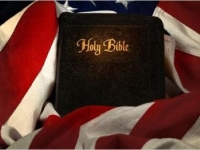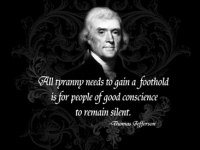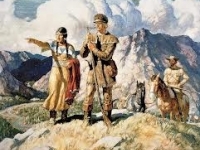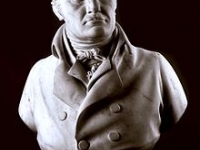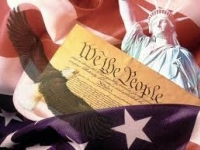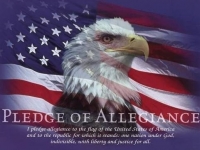Politics
AMERICAN HERITAGE OF THE PEOPLE FOR THE PEOPLE BY THE PEOPLE
SECULAR & NON-SECULAR
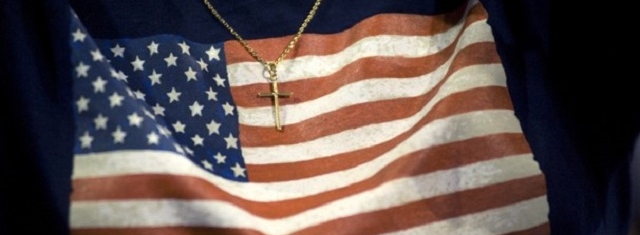
Freedom and Expression (Source: Washington Post)
USPA NEWS -
The world will little note, nor long remember what we say here, but it can never forget what they did here. It is for us the living, rather, to be dedicated here to the unfinished work which they who fought here have thus far so nobly advanced. ~ Thomas Jefferson
Our fathers brought forth on this continent, a new nation, conceived in Liberty, and dedicated to the proposition that all men are created equal.
The world will little note, nor long remember what we say here, but it can never forget what they did here. It is for us the living, rather, to be dedicated here to the unfinished work which they who fought here have thus far so nobly advanced.
The world will little note, nor long remember what we say here, but it can never forget what they did here. It is for us the living, rather, to be dedicated here to the unfinished work which they who fought here have thus far so nobly advanced.
It is rather for us to be here dedicated to the great task remaining before us “” that from these honored dead we take increased devotion to that cause for which they gave the last full measure of devotion “” that we here highly resolve that these dead shall not have died in vain “” that this nation, under God, shall have a new birth of freedom “” and that government of the people, by the people, for the people, shall not perish from the earth. ~ Abraham Lincoln Gettysburg Address.
Thomas Jefferson stated what can only be ascertained as the obvious as did President Harry S. Truman.
“The fundamental basis of this nation´s laws was given to Moses on the Mount“¦If we don´t have a proper fundamental moral background, we will finally end up with a totalitarian government which does not believe in rights for anybody except the State. “
“” Harry S. Truman
We can further examine the roots of President Harry S. Truman's statement, also in defense of the First amendment of The United States Constitution, by examining the letter to the Danbury Baptists.
“The fundamental basis of this nation´s laws was given to Moses on the Mount“¦If we don´t have a proper fundamental moral background, we will finally end up with a totalitarian government which does not believe in rights for anybody except the State. “
“” Harry S. Truman
We can further examine the roots of President Harry S. Truman's statement, also in defense of the First amendment of The United States Constitution, by examining the letter to the Danbury Baptists.
Gettysburg, Pennsylvania
November 19, 1863
On June 1, 1865, Senator Charles Sumner commented on what is now considered the most famous speech by President Abraham Lincoln. In his eulogy on the slain president, he called it a “monumental act.“ He said Lincoln was mistaken that “the world will little note, nor long remember what we say here.“ Rather, the Bostonian remarked,
November 19, 1863
On June 1, 1865, Senator Charles Sumner commented on what is now considered the most famous speech by President Abraham Lincoln. In his eulogy on the slain president, he called it a “monumental act.“ He said Lincoln was mistaken that “the world will little note, nor long remember what we say here.“ Rather, the Bostonian remarked,
The Final Letter, as Sent
To messers. Nehemiah Dodge, Ephraim Robbins, & Stephen S. Nelson, a committee of the Danbury Baptist association in the state of Connecticut.
Gentlemen
The affectionate sentiments of esteem and approbation which you are so good as to express towards me, on behalf of the Danbury Baptist association, give me the highest satisfaction. my duties dictate a faithful and zealous pursuit of the interests of my constituents, & in proportion as they are persuaded of my fidelity to those duties, the discharge of them becomes more and more pleasing.
To messers. Nehemiah Dodge, Ephraim Robbins, & Stephen S. Nelson, a committee of the Danbury Baptist association in the state of Connecticut.
Gentlemen
The affectionate sentiments of esteem and approbation which you are so good as to express towards me, on behalf of the Danbury Baptist association, give me the highest satisfaction. my duties dictate a faithful and zealous pursuit of the interests of my constituents, & in proportion as they are persuaded of my fidelity to those duties, the discharge of them becomes more and more pleasing.
Believing with you that religion is a matter which lies solely between Man & his God, that he owes account to none other for his faith or his worship, that the legitimate powers of government reach actions only, & not opinions, I contemplate with sovereign reverence that act of the whole American people which declared that their legislature should “make no law respecting an establishment of religion, or prohibiting the free exercise thereof,“ thus building a wall of separation between Church & State. Adhering to this expression of the supreme will of the nation in behalf of the rights of conscience, I shall see with sincere satisfaction the progress of those sentiments which tend to restore to man all his natural rights, convinced he has no natural right in opposition to his social duties.
I reciprocate your kind prayers for the protection & blessing of the common father and creator of man, and tender you for yourselves & your religious association, assurances of my high respect & esteem.
Th Jefferson
Jan. 1. 1802.
Congress shall make no law respecting an establishment of religion, or prohibiting the free exercise thereof; or abridging the freedom of speech, or of the press; or the right of the people peaceably to assemble, and to petition the government for a redress of grievances.
Th Jefferson
Jan. 1. 1802.
Congress shall make no law respecting an establishment of religion, or prohibiting the free exercise thereof; or abridging the freedom of speech, or of the press; or the right of the people peaceably to assemble, and to petition the government for a redress of grievances.
The real reason the Pilgrims came to the New World was to flee religious persecution. Thanksgiving is based around remembrance of the tale of how, in 1621, Native Americans helped the Pilgrims at Plymouth Colony survive harsh conditions by sharing their food with them. In other words, Thanksgiving is a parable about how people should take care of eachother and not just look out for themselves.
Today, millions of Americans celebrate Thanksgiving with their families. To mark this holiday, Rep. Todd Akin (R-MO) took to the floor of the House of Representatives on Tuesday to explain its history. At one point, he opined, “It might be helpful to think back and say there´s more to Thanksgiving than the Pilgrims.“ He explained that they were “a group of people who were willing to change the system, to think of different ideas.“ Akin continued, “They came here with the idea that after trying socialism that it wasn´t going to work. They realized that it was unbiblical, that it was a form of theft, so they pitched socialism out. They learned that in the 1620s“:
AKIN: It might be helpful to think back and say, there´s more to Thanksgiving than the Pilgrims. They were a group of people who were willing to change the system, to think of different ideas. They came here and separated civil and church governments. They came here and created the model of a written constitution, the idea that the government should be the servant of the people. [“¦] They came here with the idea that after trying socialism that it wasn´t going to work. They realized that it was unbiblical, that it was a form of theft, so they pitched socialism out. They learned that in the early 1620´s.
So then what is religious freedom? What is the authority of American Government?
Usurpers would bring up Treaty of Tripoli but this is a stab in the dark for the dark. Why?
The founding authority of America and it´s government is God. The treaty of Tripoli is correct.
1. America was not founded by Christians as a christian nation.
2. Christians however believe in God and Jesus.
3. Some believe in God and not Jesus.
4. Religious freedom? No matter what your belief they all believed in God.
5. America was founded as a nation under God. I.E. Christians, Puritans, Deists, Unitarians etc.
6. Separation of church and state was to keep the state out of church not church out of state.
Usurpers would bring up Treaty of Tripoli but this is a stab in the dark for the dark. Why?
The founding authority of America and it´s government is God. The treaty of Tripoli is correct.
1. America was not founded by Christians as a christian nation.
2. Christians however believe in God and Jesus.
3. Some believe in God and not Jesus.
4. Religious freedom? No matter what your belief they all believed in God.
5. America was founded as a nation under God. I.E. Christians, Puritans, Deists, Unitarians etc.
6. Separation of church and state was to keep the state out of church not church out of state.
Let us examine the treaty of Tripoli in simplicity as fast talkers like to bring it up then avoid the simple truth ...
Art. 11. As the Government of the United States of America is not, in any sense, founded on the Christian religion; as it has in itself no character of enmity against the laws, religion, or tranquility, of Mussulmen; and, as the said States never entered into any war, or act of hostility against any Mahometan nation, it is declared by the parties, that no pretext arising from religious opinions, shall ever produce an interruption of the harmony existing between the two countries.
Art. 11. As the Government of the United States of America is not, in any sense, founded on the Christian religion; as it has in itself no character of enmity against the laws, religion, or tranquility, of Mussulmen; and, as the said States never entered into any war, or act of hostility against any Mahometan nation, it is declared by the parties, that no pretext arising from religious opinions, shall ever produce an interruption of the harmony existing between the two countries.
America was founded by the authority of God and not any specific belief of religious worship practices. One nation under God with liberty and Justice for all. Worshiping God and by what religion you so choose are 2 separate issues.
God is the authority of man, man has dominion over the earth and government was instituted to protect these God given rights.
God is the authority of man, man has dominion over the earth and government was instituted to protect these God given rights.
Art. 12.In case of any dispute, arising from a violation of any of the articles of this treaty, no appeal shall be made to arms; nor shall war be declared on any pretext whatever. But if the Consul, residing at the place where the dispute shall happen, shall not be able to settle the same, an amicable referrence shall be made to the mutual friend of the parties, the Dey of Algiers; the parties hereby engaging to abide by his decision. And he, by virtue of his signature to this treaty, engages for himself and successors to declare the justice of the case, according to the true interpretation of the treaty, and to use all the means in his power to enforce the observance of the same.
Signed and sealed at Tripoli of Barbary the 3d day of Junad in the year of the Hegira 1211“” corresponding with the 4th day of November, 1796, by:
JUSSOF BASHAW MAHOMET, Bey. MAMET, Treasurer.
AMET, Minister of Marine.
SOLIMAN KAYA.
GALIL, General of the Troops.
MAHOMET, Commander of the City.
AMET, Chamberlain.
ALLY, Chief of the Divan.
MAMET, Secretary.
Signed and sealed at Algiers, the 4th day of Argill, 1211“”corresponding with the 3d day of
January, 1797,
And by the agent Plenipotentiary of the United States of America,
JOEL BARLOW.
JUSSOF BASHAW MAHOMET, Bey. MAMET, Treasurer.
AMET, Minister of Marine.
SOLIMAN KAYA.
GALIL, General of the Troops.
MAHOMET, Commander of the City.
AMET, Chamberlain.
ALLY, Chief of the Divan.
MAMET, Secretary.
Signed and sealed at Algiers, the 4th day of Argill, 1211“”corresponding with the 3d day of
January, 1797,
And by the agent Plenipotentiary of the United States of America,
JOEL BARLOW.
Minister Plenipotentiary is, under the terms of the Congress of Vienna of 1815, a diplomat of the second class, ranking between an Ambassador and a Minister Resident.
an amicable referrence shall be made to the mutual friend of the parties, the Dey of Algiers; the parties hereby engaging to abide by his decision. And he, by virtue of his signature to this treaty, engages for himself and successors to declare the justice of the case, according to the true interpretation of the treaty, and to use all the means in his power to enforce the observance of the same.
an amicable referrence shall be made to the mutual friend of the parties, the Dey of Algiers; the parties hereby engaging to abide by his decision. And he, by virtue of his signature to this treaty, engages for himself and successors to declare the justice of the case, according to the true interpretation of the treaty, and to use all the means in his power to enforce the observance of the same.
Ruthless, unconventional foes are not new to the United States of America. More than two hundred years ago the newly established United States made its first attempt to fight an overseas battle to protect its private citizens by building an international coalition against an unconventional enemy. Then the enemies were pirates and piracy. The focus of the United States and a proposed international coalition was the Barbary Pirates of North Africa.
Ruthless, unconventional foes are not new to the United States of America. More than two hundred years ago the newly established United States made its first attempt to fight an overseas battle to protect its private citizens by building an international coalition against an unconventional enemy. Then the enemies were pirates and piracy. The focus of the United States and a proposed international coalition was the Barbary Pirates of North Africa.
Pirate ships and crews from the North African states of Tripoli, Tunis, Morocco, and Algiers (the Barbary Coast) were the scourge of the Mediterranean. Capturing merchant ships and holding their crews for ransom provided the rulers of these nations with wealth and naval power. In fact, the Roman Catholic Religious Order of Mathurins had operated from France for centuries with the special mission of collecting and disbursing funds for the relief and ransom of prisoners of Mediterranean pirates.
Before the United States obtained its independence in the American Revolution, 1775-83, American merchant ships and sailors had been protected from the ravages of the North African pirates by the naval and diplomatic power of Great Britain. British naval power and the tribute or subsidies Britain paid to the piratical states protected American vessels and crews. During the Revolution, the ships of the United States were protected by the 1778 alliance with France, which required the French nation to protect “American vessels and effects against all violence, insults, attacks, or depredations, on the part of the said Princes and States of Barbary or their subjects.“
After the United States won its independence in the treaty of 1783, it had to protect its own commerce against dangers such as the Barbary pirates. As early as 1784 Congress followed the tradition of the European shipping powers and appropriated $80,000 as tribute to the Barbary states, directing its ministers in Europe, Thomas Jefferson and John Adams, to begin negotiations with them. Trouble began the next year, in July 1785, when Algerians captured two American ships and the dey of Algiers held their crews of twenty-one people for a ransom of nearly $60,000.
Thomas Jefferson, United States minister to France, opposed the payment of tribute, as he later testified in words that have a particular resonance today. In his autobiography Jefferson wrote that in 1785 and 1786 he unsuccessfully “endeavored to form an association of the powers subject to habitual depredation from them. I accordingly prepared, and proposed to their ministers at Paris, for consultation with their governments, articles of a special confederation.“ Jefferson argued that “The object of the convention shall be to compel the piratical States to perpetual peace.“
Jefferson prepared a detailed plan for the interested states. “Portugal, Naples, the two Sicilies, Venice, Malta, Denmark and Sweden were favorably disposed to such an association,“ Jefferson remembered, but there were “apprehensions“ that England and France would follow their own paths, “and so it fell through.“
Paying the ransom would only lead to further demands, Jefferson argued in letters to future presidents John Adams, then America´s minister to Great Britain, and James Monroe, then a member of Congress. As Jefferson wrote to Adams in a July 11, 1786, letter, “I acknolege [sic] I very early thought it would be best to effect a peace thro´ the medium of war.“
Paying the ransom would only lead to further demands, Jefferson argued in letters to future presidents John Adams, then America´s minister to Great Britain, and James Monroe, then a member of Congress. As Jefferson wrote to Adams in a July 11, 1786, letter, “I acknolege [sic] I very early thought it would be best to effect a peace thro´ the medium of war.“
Paying tribute will merely invite more demands, and even if a coalition proves workable, the only solution is a strong navy that can reach the pirates, Jefferson argued in an August 18, 1786, letter to James Monroe: “The states must see the rod; perhaps it must be felt by some one of them. . . . Every national citizen must wish to see an effective instrument of coercion, and should fear to see it on any other element than the water. A naval force can never endanger our liberties, nor occasion bloodshed; a land force would do both.“
“From what I learn from the temper of my countrymen and their tenaciousness of their money,“ Jefferson added in a December 26, 1786, letter to the president of Yale College, Ezra Stiles, “it will be more easy to raise ships and men to fight these pirates into reason, than money to bribe them.“
Jefferson´s plan for an international coalition foundered on the shoals of indifference and a belief that it was cheaper to pay the tribute than fight a war. The United States´s relations with the Barbary states continued to revolve around negotiations for ransom of American ships and sailors and the payment of annual tributes or gifts. Even though Secretary of State Jefferson declared to Thomas Barclay, American consul to Morocco, in a May 13, 1791, letter of instructions for a new treaty with Morocco that it is “lastly our determination to prefer war in all cases to tribute under any form, and to any people whatever,“ the United States continued to negotiate for cash settlements.
In 1795 alone the United States was forced to pay nearly a million dollars in cash, naval stores, and a frigate to ransom 115 sailors from the dey of Algiers. Annual gifts were settled by treaty on Algiers, Morocco, Tunis, and Tripoli.
When Jefferson became president in 1801 he refused to accede to Tripoli´s demands for an immediate payment of $225,000 and an annual payment of $25,000. The pasha of Tripoli then declared war on the United States. Although as secretary of state and vice president he had opposed developing an American navy capable of anything more than coastal defense, President Jefferson dispatched a squadron of naval vessels to the Mediterranean. As he declared in his first annual message to Congress:
When Jefferson became president in 1801 he refused to accede to Tripoli´s demands for an immediate payment of $225,000 and an annual payment of $25,000. The pasha of Tripoli then declared war on the United States. Although as secretary of state and vice president he had opposed developing an American navy capable of anything more than coastal defense, President Jefferson dispatched a squadron of naval vessels to the Mediterranean. As he declared in his first annual message to Congress:
“To this state of general peace with which we have been blessed, one only exception exists. Tripoli, the least considerable of the Barbary States, had come forward with demands unfounded either in right or in compact, and had permitted itself to denounce war, on our failure to comply before a given day. The style of the demand admitted but one answer. I sent a small squadron of frigates into the Mediterranean. . . .“
The American show of force quickly awed Tunis and Algiers into breaking their alliance with Tripoli. The humiliating loss of the frigate Philadelphia and the capture of her captain and crew in Tripoli in 1803, criticism from his political opponents, and even opposition within his own cabinet did not deter Jefferson from his chosen course during four years of war. The aggressive action of Commodore Edward Preble (1803-4) forced Morocco out of the fight and his five bombardments of Tripoli restored some order to the Mediterranean.
However, it was not until 1805, when an American fleet under Commodore John Rogers and a land force raised by an American naval agent to the Barbary powers, Captain William Eaton, threatened to capture Tripoli and install the brother of Tripoli´s pasha on the throne, that a treaty brought an end to the hostilities. Negotiated by Tobias Lear, former secretary to President Washington and now consul general in Algiers, the treaty of 1805 still required the United States to pay a ransom of $60,000 for each of the sailors held by the dey of Algiers, and so it went without Senatorial consent until April 1806.
Nevertheless, Jefferson was able to report in his sixth annual message to Congress in December 1806 that in addition to the successful completion of the Lewis and Clark expedition, “The states on the coast of Barbary seem generally disposed at present to respect our peace and friendship.“
In fact, it was not until the second war with Algiers, in 1815, that naval victories by Commodores William Bainbridge and Stephen Decatur led to treaties ending all tribute payments by the United States. European nations continued annual payments until the 1830s. However, international piracy in Atlantic and Mediterranean waters declined during this time under pressure from the Euro-American nations, who no longer viewed pirate states as mere annoyances during peacetime and potential allies during war.
Truth be known“¦
Joel Barlow (March 24, 1754 ““ December 26, 1812) was an American poet, diplomat and politician.[1] In his own time, Barlow was well-known for the epic Vision of Columbus. Modern readers may be more familiar with “The Hasty Pudding“ (1793). He also drafted the Treaty of Tripoli, which includes the phrase: “the United States of America is not, in any sense, founded on the Christian religion“. This statement; however, was later repealed by the United States Congress.
So what about Joel Barlow and Ohio? Barlow, Ohio is named in his honor. So regardless of your religious beliefs or whether you believe in God or not America was founded on the authority of God with liberty and justice for all as those morals and beliefs of those under God are of such good will, love and protection as ordained by God, man and the common good of all men being created equal.
Those freedoms those enjoy everyday were given by the divine authority of God per Divine providence and as such since the founding of this great nation certain recognition and respect has always been given thus keeping this nation free and independent and further keeping the state out of the church, ministry or houses of God and in fact not the other way around. The first amendment was not a gag order to silence the church but to keep the state from silencing the very foundation of its governing authority.
No law respecting or prohibiting“¦“¦“¦. because the state has no authority over the authority that gave it the authority to govern I.E. God fearing good men, women and children under the authority of nature and nature´s God “¦“¦..of the people by the people and for the people.
“The fundamental basis of this nation´s laws was given to Moses on the Mount“¦If we don´t have a proper fundamental moral background, we will finally end up with a totalitarian government which doesnot believe in rights for anybody except the State. “
“” Harry S. Truman
“The fundamental basis of this nation´s laws was given to Moses on the Mount“¦If we don´t have a proper fundamental moral background, we will finally end up with a totalitarian government which doesnot believe in rights for anybody except the State. “
“” Harry S. Truman
One nation, under God, indivisible, with liberty and justice for all“¦..
One nation? All men are created equal with unalienable God given rights.
Under God? And for the support of this Declaration, with a firm reliance on the protection of Divine Providence (God not the christian or any other religious belief but as the one God all believe in no matter what their disposition or position is).
With liberty and justice for all? Equity as all deserve the freedoms and liberties of dominion over earth as a God given right to life, liberty and the pursuit of happiness.
Treaty of Tripoli was repealed in accordance with Article 12 of the Treaty of Tripoli as the Dey of Algiers were not our friends but pirates.
The truth of the first amendment and this great nation was that free speech and worship was a God given right and America was not founded by Christianity (a religion) but by the authority of God and divine providence.
In the beginning there was the word, “let there be light and it was done as the word of God spoke it into existence the word of God was the power of God“, and the word of God was with God, “the power of God was with God“, and the word was God, “the power of God was God whether through his words or working through his servants and prophets it was God“ I.E. give the glory to God (the english translation for the supreme being or father of creation).
In the beginning there was the word, “let there be light and it was done as the word of God spoke it into existence the word of God was the power of God“, and the word of God was with God, “the power of God was with God“, and the word was God, “the power of God was God whether through his words or working through his servants and prophets it was God“ I.E. give the glory to God (the english translation for the supreme being or father of creation).
God said and the sojourners shall live amongst you thus governments were instituted among men to protect us with ministerial authority and to enact laws to govern the non-believers and to ensure the public good between and to also ensure tranquility for prosperity with liberty and justice for all.
This is why if a law should conflict with the laws of the divine with supremacy of authority as it so shall be held as unconstitutional as the term private international law or conflict of laws is set out to address.
This has been another objective review with a ministerial point of view from The Objective Review.
This is why if a law should conflict with the laws of the divine with supremacy of authority as it so shall be held as unconstitutional as the term private international law or conflict of laws is set out to address.
This has been another objective review with a ministerial point of view from The Objective Review.
more information: https://www.facebook.com/theobjectivereview
Religion Objective Review Ohio Barlow Landmark Treaty History News Religion Politics America Settlers Lincoln Constitution Congress God Catholic Christian Deist Founding Fathers Non-secular Secular Government
Liability for this article lies with the author, who also holds the copyright. Editorial content from USPA may be quoted on other websites as long as the quote comprises no more than 5% of the entire text, is marked as such and the source is named (via hyperlink).

